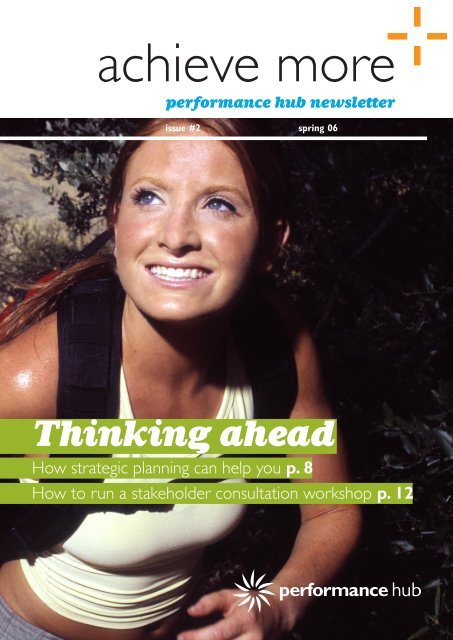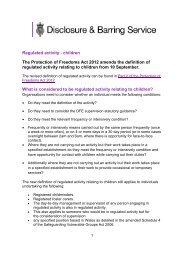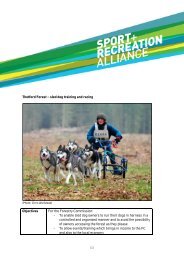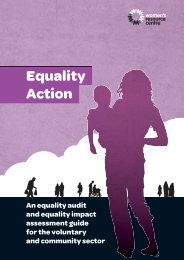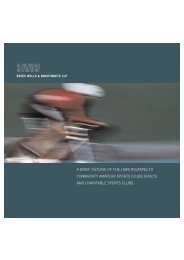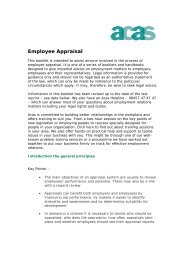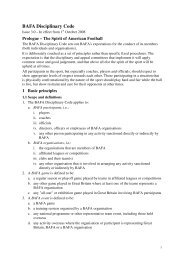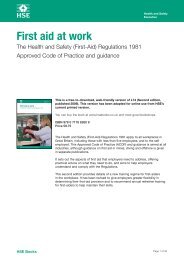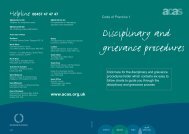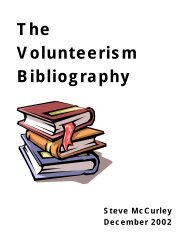Achieve More 2 - National Council for Voluntary Organisations
Achieve More 2 - National Council for Voluntary Organisations
Achieve More 2 - National Council for Voluntary Organisations
You also want an ePaper? Increase the reach of your titles
YUMPU automatically turns print PDFs into web optimized ePapers that Google loves.
per<strong>for</strong>mance hub newsletter<br />
issue #2 spring 06<br />
Thinking ahead<br />
How strategic planning can help you p. 8<br />
How to run a stakeholder consultation workshop p. 12
2<br />
3<br />
per<strong>for</strong>mance hub newsletter<br />
The Per<strong>for</strong>mance Hub works to<br />
help voluntary and community<br />
organisations (VCOs) achieve more.<br />
HUBS<br />
Per<strong>for</strong>mance Hub<br />
to know that 84% of you thought<br />
the first issue was good or very<br />
good. We’ll be working very hard<br />
to maintain or improve on this.<br />
Vision<br />
The Per<strong>for</strong>mance Hub’s vision<br />
is of voluntary and community<br />
organisations having a positive impact<br />
upon the lives of millions because<br />
they are per<strong>for</strong>ming excellently.<br />
Aims<br />
The Hub’s aim is to enable VCOs to<br />
better achieve their mission by placing<br />
per<strong>for</strong>mance improvement at the heart of<br />
the <strong>Voluntary</strong> and Community Sector (VCS).<br />
Four specific aims contribute<br />
to this overall aim:<br />
|020 7520 2540<br />
helpline: 0800 652 5787<br />
"info@per<strong>for</strong>mancehub.org.uk<br />
www.per<strong>for</strong>mancehub.org.uk<br />
Finance Hub<br />
|020 7832 3014<br />
"plambert@cafonline.org<br />
www.financehub.org.uk<br />
Governance Hub<br />
|020 7713 6161<br />
"governancehub@ncvo-vol.org.uk<br />
www.governancehub.org.uk<br />
WELCOME<br />
Whilst most people found the<br />
newsletter very clear, a few of you<br />
found the in<strong>for</strong>mation too basic.<br />
Our main focus in this newsletter<br />
is to make per<strong>for</strong>mance issues<br />
accessible to busy managers with<br />
little time or few resources and who<br />
are perhaps new to per<strong>for</strong>mance.<br />
<strong>More</strong> in–depth in<strong>for</strong>mation will be<br />
available on our interactive website<br />
from April 2006 and we continue to<br />
welcome your comments and insight.<br />
If you know of a useful resource, please<br />
tell us so we can let others know.<br />
1. to increase VCOs’ understanding<br />
of and ability to use per<strong>for</strong>mance<br />
improvement approaches;<br />
2. to enable local, sub–regional, regional and<br />
national infrastructure to better support<br />
VCOs in per<strong>for</strong>mance improvement;<br />
3. to increase the relevance and effectiveness<br />
of the knowledge base about per<strong>for</strong>mance<br />
improvement available to VCOs, and<br />
4. to create a more supportive external<br />
environment around per<strong>for</strong>mance<br />
improvement <strong>for</strong> VCOs.<br />
For more in<strong>for</strong>mation see our website<br />
at www.per<strong>for</strong>mancehub.org.uk<br />
The Per<strong>for</strong>mance Hub is a partnership.<br />
Charities Evaluation Services (CES) is the<br />
accountable body. CES and the <strong>National</strong><br />
<strong>Council</strong> <strong>for</strong> <strong>Voluntary</strong> <strong>Organisations</strong><br />
(NCVO) are joint lead partners. CES is a<br />
company limited by guarantee. Registered in<br />
England and Wales no. 2510318. Registered<br />
office: 4 Coldbath Square, London, EC1R<br />
5HL. Registered charity no. 803602.<br />
ICT Hub<br />
|020 7520 2509<br />
"ICTresources@ncvo-vol.org.uk<br />
www.ictconsortium.org.uk<br />
Volunteering Hub<br />
|0121 633 5534<br />
"volunteeringhub@volunteeringengland.org<br />
www.volunteeringengland.org.uk/aboutus/volunteeringhub<br />
Work<strong>for</strong>ce Hub<br />
|020 7520 2490<br />
"work<strong>for</strong>cehub@ncvo-vol.org.uk<br />
www.voluntarysectorskills.org.uk<br />
Editor: Julie Pottinger |020 7520 2587 "editor@per<strong>for</strong>mancehub.org.uk<br />
Distribution: Kate Damiral |020 7520 2540 "subscribe@per<strong>for</strong>mancehub.org.uk<br />
Design and production: Public Life |07843 058485 "mike@publiclife.co.uk<br />
Contributors: Jake Eliot, Julie Pottinger, Chris Ramsbottom, Stella Smith<br />
Editorial board: Richard Piper, Tim Wilson<br />
Copyright: While the Hub makes every ef<strong>for</strong>t to ensure the in<strong>for</strong>mation<br />
in this newsletter is accurate, we accept no responsibility <strong>for</strong> any errors<br />
or issues that may arise from its use. © CES and NCVO 2006.<br />
This second edition comes at an<br />
exciting time <strong>for</strong> the Per<strong>for</strong>mance<br />
Hub, as we leap into Spring 2006<br />
with a number of new services,<br />
such as our website, a suite of<br />
support services <strong>for</strong> infrastructure<br />
and our free phone helpline.<br />
One of the Hub’s key topic areas is<br />
‘thinking and planning strategically’.<br />
Most of us have been told at one<br />
time or another to ‘be more<br />
strategic’. But what does this mean in<br />
the real world As the Hub develops<br />
its work programme on strategy, this<br />
issue introduces the topic, provides<br />
a case study and offers suggestions<br />
of where to go to find out more.<br />
We received an overwhelming<br />
response to our first issue with<br />
hundreds of you giving valuable<br />
feedback or signing up to our<br />
Active Network. We were pleased<br />
Please continue to send your<br />
news, feedback, and details of<br />
events and publications to me at<br />
editor@per<strong>for</strong>mancehub.org.uk.<br />
Julie Pottinger<br />
<strong>Achieve</strong> <strong>More</strong> Editor<br />
IN THIS ISSUE<br />
News in brief<br />
Getting support with strategy<br />
Thinking ahead<br />
Art of strategy<br />
How to … run a<br />
stakeholder workshop<br />
Case study: planning <strong>for</strong> success<br />
4<br />
6<br />
8<br />
11<br />
12<br />
14
4<br />
NEWS<br />
HELPLINE<br />
It’s good to talk<br />
WEBSITE<br />
The Per<strong>for</strong>mance Hub free phone<br />
helpline will be ready to take your<br />
calls from 3 rd April. The first helpline<br />
in England dedicated to per<strong>for</strong>mance<br />
improvement in the voluntary<br />
sector will offer general in<strong>for</strong>mation<br />
on per<strong>for</strong>mance improvement and<br />
advise on further sources of support.<br />
Our advisers will be available<br />
Monday to Friday, 8am–6pm<br />
|0800 652 5787<br />
WORKSHOP<br />
Making your<br />
money do more<br />
A workshop <strong>for</strong> funders<br />
The Per<strong>for</strong>mance Hub is holding a<br />
free half–day workshop <strong>for</strong> funders to<br />
explore how they can help their money<br />
go further by supporting per<strong>for</strong>mance<br />
improvement in the organisations<br />
they fund. The workshop will provide<br />
an opportunity <strong>for</strong> funders to share<br />
learning and network.<br />
London, Thursday 6 th April<br />
Contact Jake Eliot<br />
|020 7520 2508<br />
"jake.eliot@ncvo-vol.org.uk<br />
SUPPORT<br />
Shout about<br />
success<br />
Compass Partnership is working<br />
with groups of three to five national<br />
charities to help them articulate the<br />
difference they make. The programme<br />
runs <strong>for</strong> 12 months and enables<br />
organisations to challenge and learn<br />
from each other.<br />
Contact Debbie Emerson<br />
|01628 478561<br />
www.compasspartnership.co.uk<br />
coming soon: www.per<strong>for</strong>mancehub.org.uk<br />
5<br />
SOFTWARE<br />
Per<strong>for</strong>mance tool<br />
Social Firms UK has launched a new<br />
practical per<strong>for</strong>mance management<br />
tool. The ‘Per<strong>for</strong>mance Dashboard’<br />
is based on the Balanced Scorecard<br />
and enables social firms to monitor<br />
and report on their progress. The<br />
Dashboard is available as a CD–ROM<br />
and costs £90 <strong>for</strong> non–members.<br />
Contact Mark Daly<br />
|01737 764021<br />
"info@socialfirms.co.uk<br />
www.socialfirms.co.uk/index.php/<br />
Section107.html<br />
MANAGEMENT<br />
Charity talks 2006<br />
New<br />
Per<strong>for</strong>mance<br />
Hub website<br />
The Per<strong>for</strong>mance Hub’s new<br />
website is set to launch in<br />
early April and will offer a<br />
range of useful services <strong>for</strong><br />
voluntary, community and<br />
social enterprise organisations,<br />
including in<strong>for</strong>mation,<br />
support and opportunities <strong>for</strong><br />
interaction and feedback.<br />
The ‘Learn more’ section<br />
offers practical in<strong>for</strong>mation<br />
on ways to achieve more <strong>for</strong><br />
your cause. Topics addressed<br />
include strategic planning,<br />
quality, monitoring and<br />
evaluation and benchmarking,<br />
alongside articles explaining<br />
the importance of per<strong>for</strong>mance<br />
improvement. A number of<br />
case studies provide real–life<br />
examples of some of the key<br />
concepts being put into effect.<br />
For people wishing to<br />
explore further, the site<br />
also offers details of some<br />
of the best publications on<br />
per<strong>for</strong>mance–related topics<br />
and signposts you to key<br />
downloads and worthwhile<br />
resources on other sites.<br />
The section called ‘Services<br />
and support’ offers in<strong>for</strong>mation<br />
on how to get or give direct<br />
support. Here people looking<br />
<strong>for</strong> support and advice<br />
on per<strong>for</strong>mance will find<br />
contact details both locally<br />
and nationally, while people<br />
who offer support can find<br />
out about the Per<strong>for</strong>mance<br />
Hub’s ‘mentors’ scheme and<br />
free training opportunities.<br />
The site provides plenty of<br />
opportunities <strong>for</strong> you to<br />
interact with the Hub and<br />
provide feedback. A feature<br />
called ‘Your questions’<br />
enables you to post questions<br />
of interest and also review<br />
questions posed by others.<br />
Many of the pages have a<br />
feature which allows you to<br />
offer your own comments on<br />
the issues being discussed.<br />
If you find the site helpful,<br />
we’d strongly recommend that<br />
you join our Active Network<br />
online to receive our regular<br />
electronic newsletter, which<br />
will keep you updated on<br />
key developments with the<br />
Hub, as well as alert you<br />
to important events and<br />
valuable new in<strong>for</strong>mation<br />
as it becomes available.<br />
The Centre <strong>for</strong> Charity Effectiveness<br />
at CASS Business School in London<br />
is holding a series of talks on key<br />
management issues. The next talk on<br />
24 May is on ‘Expanding while keeping<br />
your organisation lean and focused’.<br />
There is a talk on delivering strategic<br />
change on 4 October.<br />
Contact Karen Hickox<br />
|020 7040 8781<br />
"k.hickox@city.ac.uk<br />
www.centre<strong>for</strong>charity<br />
effectiveness.org<br />
MARKETING<br />
ImpACT<br />
Coalition<br />
Since its launch in July 2005, the<br />
Coalition has worked to increase public<br />
understanding of charities’ work. Over<br />
50 top charities have now signed up,<br />
including Cancer Research UK, Oxfam<br />
and Shelter.<br />
Contact Campbell Robb<br />
|020 7713 6161<br />
"campbell.robb@ncvo-vol.org.uk<br />
www.ncvo-vol.org.<br />
uk/accountability
6 7<br />
TRAINING<br />
SUPPORT<br />
Services <strong>for</strong><br />
support workers<br />
Getting Support with Strategy<br />
The Per<strong>for</strong>mance Hub is launching<br />
a suite of services targeted at those<br />
who give, or would like to give,<br />
support and advice to frontline<br />
voluntary, community and social<br />
enterprise organisations (VCOs).<br />
Many organisations value one–to–one<br />
support, a service that is currently<br />
offered by a range of infrastructure<br />
organisations. But not all VCOs have<br />
access to the services they need. At the<br />
same time, many development workers<br />
are interested in updating their skills and<br />
sharing their knowledge with peers.<br />
The Hub is working to address<br />
these needs. From May 2006, it will<br />
offer free services <strong>for</strong> ‘per<strong>for</strong>mance<br />
mentors’. This includes training on<br />
per<strong>for</strong>mance improvement, peer<br />
networking and mentoring support.<br />
The Hub is piloting its training courses<br />
in April across England’s nine regions.<br />
These courses will be suitable <strong>for</strong><br />
those new to the subject, as well<br />
as experienced practitioners who<br />
want to update their knowledge<br />
or exchange ideas. They will give a<br />
thorough grounding in per<strong>for</strong>mance<br />
improvement approaches and guidance<br />
on explaining the concepts to others.<br />
Six different modules will be available:<br />
Quality, Benchmarking, Monitoring<br />
and Evaluation, Outcomes, Strategic<br />
Planning and a core module, which<br />
will draw these themes together. Each<br />
module will run at least once in each<br />
region over the next year and there<br />
will be 16 places on each course.<br />
Sign up through the website<br />
www.per<strong>for</strong>mancehub.org.uk<br />
or contact us<br />
|020 7713 5722<br />
mentors@per<strong>for</strong>mancehub.org.uk<br />
Chief Executives of small organisations are<br />
often so tied up with operational problems<br />
that they don’t have time <strong>for</strong> strategy. Julie<br />
Pottinger talks to Lisa Shrevel, Sustainable<br />
Development Manager at bassac, about current<br />
initiatives <strong>for</strong> helping small organisations<br />
find the time—and space—to think.<br />
Finding time<br />
Lisa believes that many small voluntary and community<br />
organisations realise the value of thinking ahead.<br />
Strategy can make your organisation more effective and,<br />
importantly, more sustainable. The problem is finding<br />
the time: “Most organisations know that if they could<br />
commit more time to strategic planning, they could<br />
deliver better services and become more sustainable.”<br />
She argues that they need to find time to think and reflect<br />
on the future of their organisations, which is why bassac<br />
runs a number of initiatives to help them do that.<br />
Pooling resources<br />
One way small organisations can free up more time<br />
is by sharing back office functions, such as IT and HR.<br />
bassac is currently piloting a programme called SWiM<br />
(Sharing Without Merging) which helps organisations<br />
do this. A similar service is being offered by NCVO’s<br />
Collaborative Working Unit, which provides advice to<br />
voluntary organisations wanting to share resources.<br />
An extra pair of hands<br />
A skilled extra person providing cover <strong>for</strong> a limited period<br />
can allow senior staff to get away to think about strategy.<br />
bassac is developing a bank of community sector experts<br />
who are able to offer extra capacity and expertise when<br />
organisations are facing significant change or crisis.<br />
Strategic Review Programme<br />
bassac is also piloting a structured Strategic Review<br />
programme which promotes shared learning between<br />
organisations. This starts with a joint workshop <strong>for</strong> the<br />
chief executives and chairs of around ten organisations.<br />
Participants explore what strategic review means <strong>for</strong> them<br />
and what the key stages are. Each organisation then prepares<br />
an outline of their approach, tailored to their needs.<br />
After three to six months, during which time bassac<br />
offers one–to–one support, the whole group meets again<br />
to review progress and identify any key issues arising.<br />
“Participants value the time the programme gives<br />
them to reflect on their organisation, network<br />
with and learn from others”, Lisa explains.<br />
Building financial capacity<br />
For many voluntary and community organisations, a reliance<br />
on short–term funding encourages short–term thinking. Like<br />
a number of infrastructure agencies, bassac offers advice<br />
to organisations on how to build their financial capacity<br />
through diversifying income, developing sustainable funding<br />
streams and recovering the real costs of their activities.<br />
Making it happen<br />
Once you have taken the time to think, it’s time to take<br />
action. Lisa stresses the importance of putting the plan<br />
into effect: “You can strategically plan until the cows come<br />
home, but making it a reality is what really matters.”<br />
“A skilled extra<br />
person providing<br />
cover <strong>for</strong> a limited<br />
period can allow<br />
senior staff to get<br />
away to think<br />
about strategy.”<br />
Further in<strong>for</strong>mation<br />
Support from an infrastructure agency can make a big<br />
difference to your success, especially if ‘strategy’ is new to<br />
your organisation. There are many agencies willing and able<br />
to help, and the Per<strong>for</strong>mance Hub website, which will be<br />
live from April 2006 at www.per<strong>for</strong>mancehub.org.uk, has<br />
contact details <strong>for</strong> many of them.<br />
bassac<br />
bassac supports its members in order to improve<br />
the lives of local communities. Its members are<br />
community based multi–purpose organisations that<br />
provide a range of services and support, tailored<br />
to meet the needs of local people. bassac offers<br />
a range of development support including:<br />
> Support with strategic review<br />
> Annual reviews to map progress and<br />
identify development needs<br />
> Specialist organisational development services<br />
Contact bassac<br />
33 Corsham Street London N1 6DR<br />
|0845 241 0375<br />
"info@bassac.org.uk<br />
bassac is one of the Per<strong>for</strong>mance Hub’s partners.<br />
NCVO’s Collaborative Working Unit<br />
The NCVO’s Collaborative Working Unit offers<br />
advice to voluntary organisations working together,<br />
including sharing back office functions.<br />
Contact Isobel Booth<br />
|020 7520 2441<br />
"collaborate@ncvo-vol.org.uk<br />
www.ncvo-vol.org.uk/collaborate<br />
If your organisation offers support to voluntary,<br />
community or social enterprise organisations on<br />
per<strong>for</strong>mance improvement, please tell us.
8 9<br />
COVER STORY<br />
Thinking<br />
Ahead<br />
What does the word ‘strategy’ mean to you To many people,<br />
strategy is something <strong>for</strong> large government departments,<br />
multi–million pound private companies and army generals.<br />
Some people assume that strategy means heavy, high level<br />
plans written by and <strong>for</strong> senior management. But there is<br />
more to strategy than just a plan. Your strategy can be in<br />
your head. It is a set of principles and assumptions about<br />
why your organisation exists, what it hopes to achieve and<br />
how it hopes to achieve it. Being strategic involves thinking<br />
about how your organisation interacts with its external<br />
environment and adapts to changing circumstances.<br />
It can be helpful to consider strategy in terms of three<br />
simultaneous processes: thinking, planning and implementing.<br />
Thinking<br />
Strategic thinking is a skill that is relevant to everyone<br />
in your organisation. You can apply strategic thinking<br />
every day, not just when drafting a plan or writing<br />
a funding bid. Strategic thinking can involve:<br />
> Seeing the big picture and understanding your<br />
organisational mission in your own terms<br />
> Thinking about the medium to long–term<br />
> Identifying the people who have a stake in your organisation,<br />
and what they want to see your organisation achieve<br />
> Considering the changing environment, and<br />
how your organisation should adapt to it<br />
Thinking strategically is an active and challenging<br />
experience and can be empowering. Putting an<br />
emphasis on thinking about strategy will affect how<br />
your plans are put together and put into practice.<br />
“A goal without a<br />
plan is just a wish.”<br />
Antoine de Saint–Exupery<br />
Top tips on strategic thinking<br />
Make time and space<br />
Find the place where you think<br />
most clearly. Whether on a bus,<br />
in the bath, or your favourite<br />
park bench, try and safeguard<br />
some spare time every week to<br />
think about where your<br />
organisation is in relation to<br />
your long–term goals and the<br />
needs of your users.<br />
Know what you need to know<br />
Conduct a mini–audit of in<strong>for</strong>mation<br />
you need to make the big decisions.<br />
What do you need and where can<br />
you get the in<strong>for</strong>mation Can your<br />
funders provide you with data<br />
on broad trends and guidance<br />
on any relevant new legislation<br />
Could you share in<strong>for</strong>mation<br />
with other organisations<br />
Two heads are better than one<br />
Your organisation is likely to be<br />
brimming over with experience<br />
and expertise, so ask around.<br />
Discussing the direction of the<br />
whole organisation with other<br />
staff can bring in fresh perspectives<br />
and help you test out ideas.<br />
“If you do not know where<br />
you are going, every road<br />
will get you nowhere.”<br />
Planning<br />
Planning helps you define where you want your organisation<br />
to go, and how it will get there, over the next three to five<br />
years. It will also help you think about the resources you<br />
have available, and how best to use them. To make sure<br />
your plan is relevant and focused on your users or cause,<br />
you should consider engaging in strategic conversations<br />
with staff, users and others who are affected by the<br />
organisation. You will also need to think about the external<br />
environment—likely changes, opportunities and challenges<br />
—and plan ways of handling these. Your discussions should<br />
end in decision and once you have agreed on a course<br />
of action, write it down and communicate it widely.<br />
Implementing<br />
Henry Kissinger<br />
Putting your strategy into practice requires your whole<br />
organisation to translate high–level principle into everyday<br />
decisions and priorities. This means that all staff (and
10<br />
COVER STORY CONTINUED<br />
OPINION<br />
11<br />
volunteers) need to understand and accept the strategy<br />
so they can play a part in bringing it to life. This is easier if<br />
you have given them a role in developing the strategy, and<br />
if you communicate the strategy to them clearly, frequently<br />
and consistently. Encourage and support staff to weave<br />
the strategic plan into their current work programmes,<br />
rather than seeing it as a separate add–on activity.<br />
Adapt your plan to changing circumstances over<br />
time. The manager who insists on sticking to the<br />
plan, even when everything else has changed, risks<br />
making a big mistake. Meetings and away days<br />
are a great opportunity to review priorities and<br />
challenge assumptions, keeping the strategy alive.<br />
“Take time to deliberate,<br />
but when the time <strong>for</strong><br />
action has arrived, stop<br />
thinking and go in.”<br />
Napoleon Bonaparte<br />
Further in<strong>for</strong>mation<br />
NCVO’s Third Sector Foresight project<br />
Provides in<strong>for</strong>mation on strategic planning, detailing<br />
trends affecting the voluntary and community sector.<br />
Contact Megan Griffith<br />
|020 7520 2483<br />
"megan.griffith@ncvo-vol.org.uk<br />
www.ncvo-vol.org.uk/3s4<br />
Thinking, planning and implementing are interdependent.<br />
You can’t start writing a plan without thinking about<br />
what your organisation wants to achieve, and there’s<br />
no point in agreeing a plan be<strong>for</strong>e you’ve considered<br />
how it’s going to be taken off the page and turned into<br />
action. All these elements need to be fused together<br />
to ensure you have an effective strategy that will help<br />
your organisation succeed over the years to come.<br />
Jake Eliot<br />
Development and Policy Officer<br />
at the Per<strong>for</strong>mance Hub<br />
Tools <strong>for</strong> Tomorrow — A practical guide to strategic<br />
planning <strong>for</strong> voluntary organisations<br />
This toolkit gives an overview of different<br />
planning models and looks at the possible<br />
impact of external factors.<br />
Price £35.00 (£24.50 NCVO members)<br />
http://shop.ncvo-vol.org.uk/main.asp<br />
0800 2798 798<br />
Per<strong>for</strong>mance Hub website<br />
See also the Think Ahead section, available from<br />
April 2006. www.per<strong>for</strong>mancehub.org.uk<br />
Art of<br />
strategy<br />
Strategy meetings can be such a dry<br />
affair! They always seem to start with<br />
a PEST, move onto a SWOT and<br />
somewhere in between review the KPIs.<br />
Then, while participants relocate to the<br />
nearest pub <strong>for</strong> some real conversation,<br />
the facilitator carts off a small <strong>for</strong>est<br />
of flipchart paper which, typed and<br />
<strong>for</strong>matted, re–emerges six months later<br />
as a glossy brochure: the strategic plan!<br />
Surely there’s more to developing a<br />
strategy than discussing management<br />
frameworks Yes, management tools<br />
and indicators can help identify<br />
issues. But to join these disparate<br />
fragments of in<strong>for</strong>mation and call<br />
it a strategy is like framing a child’s<br />
dot to dot and calling it art.<br />
Charities, community organisations<br />
and social enterprises are born out of<br />
a great idea. They have at their heart<br />
a determination to change things <strong>for</strong><br />
the better and meet an identified<br />
need. It’s this passion and vision that<br />
delivers effective outcomes <strong>for</strong> our<br />
causes. It’s this energy which attracts<br />
committed staff and volunteers, and<br />
which inspires confidence from our<br />
funders and partner organisations.<br />
Commercial companies would love to<br />
engender this kind of passion across<br />
their customers, staff and shareholders.<br />
Indeed, it seems that whilst in the charity<br />
world some of us are becoming more<br />
obsessed with bottom line per<strong>for</strong>mance<br />
measures, the commercial world is<br />
waking up to the fact that there is more<br />
to running a successful organisation<br />
than watching the indicators, counting<br />
the widgets and adjusting the dials.<br />
Strategy is a skilful balancing of different<br />
perspectives. It blends different ideas<br />
and agendas to create a movement.<br />
It’s not ‘painting by numbers’, with<br />
a fixed method and predictable<br />
result. It’s a bold and creative work<br />
of art, alive with the colour and<br />
potential to inspire shared action.<br />
So, we should not allow ourselves<br />
to be intimidated and constricted<br />
by management tools and KPIs. Our<br />
strategies should be grounded in the<br />
vision and passion, which reflects the<br />
true spirit of our organisations. KPIs,<br />
tools, and frameworks must be slaves to<br />
your own passion, not your master.<br />
Stella Smith,<br />
Independent Consultant<br />
" stella.smith@solitas.co.uk<br />
The views in ‘opinion piece’ are not necessarily those of the Per<strong>for</strong>mance Hub or its partners.<br />
“There is more<br />
to running<br />
a successful<br />
organisation<br />
than watching<br />
the indicators,<br />
counting the<br />
widgets and<br />
adjusting<br />
the dials“<br />
Some strategy terms<br />
PEST a simple framework to<br />
analyse factors in the external<br />
environment under the headings<br />
of Political, Environmental,<br />
Social and Technological.<br />
SWOT a simple framework to<br />
analyse an organisation’s strengths<br />
and weaknesses and to identify<br />
external opportunities and threats.<br />
KPIs Key Per<strong>for</strong>mance Indicators:<br />
pieces of in<strong>for</strong>mation that<br />
senior managers believe to<br />
be the key indicators of the<br />
organisation’s per<strong>for</strong>mance.
12<br />
13<br />
HOW TO...<br />
How to...<br />
Strategies work best when they incorporate the diverse<br />
views of different stakeholders. Stakeholders are the people,<br />
groups or organisations who are interested in or affected<br />
by your organisation or project. By involving different<br />
people in the development of your strategy, you will also<br />
find it easier to get them to accept and deliver it.<br />
You can consult your stakeholders through surveys or<br />
interviews, but running a workshop is a great way to<br />
bring a range of stakeholders together in one room,<br />
and to encourage a freer discussion. This article offers<br />
some ideas on to how to make this event a success.<br />
What do you want them to know and<br />
when By building good relationships<br />
with your stakeholders early on, they<br />
will be more likely to participate later.<br />
Know your aims<br />
Think about why you are running the<br />
workshop. Is it to gather in<strong>for</strong>mation<br />
If so, ask yourself what you actually<br />
want to know and what you will<br />
do with the in<strong>for</strong>mation gathered.<br />
Or do you want to bring people<br />
together If so, be clear what you<br />
hope to achieve from this.<br />
Once the date is set, invite the<br />
participants, explaining the purpose<br />
of the event. Remember to collect<br />
details of any dietary or access<br />
requirements. According to the needs<br />
of your participants you may need<br />
to hire interpreters or translators.<br />
Make sure you have adequate staffing<br />
on the day. You will probably need<br />
a presenter or facilitator and staff<br />
to meet and greet and take notes.<br />
On the day<br />
“A generous<br />
supply of<br />
good food and<br />
drink will go<br />
a long way to<br />
improving the<br />
mood of your<br />
participants<br />
on the day!”<br />
“some funders,<br />
such as Awards<br />
<strong>for</strong> All, may<br />
be willing to<br />
fund the event<br />
<strong>for</strong> you.”<br />
...run a stakeholder<br />
workshop<br />
Plan<br />
Know your stakeholders<br />
Make a list of your stakeholders<br />
and their particular interests.<br />
They will typically include:<br />
internal stakeholders, such as<br />
staff, volunteers and trustees; and<br />
external stakeholders, such<br />
as your users or beneficiaries,<br />
funders, donors and sponsors,<br />
local and central government, the<br />
media, and the local community.<br />
Keep stakeholders<br />
in the know<br />
Think about your stakeholders and<br />
how you communicate with them<br />
from the beginning of your project.<br />
How many workshops<br />
One option is to run different<br />
workshops <strong>for</strong> different stakeholder<br />
groups. This is helpful where you<br />
feel different stakeholder groups<br />
may tend towards strong conflict<br />
with each other. However, a single<br />
workshop with a diverse participant<br />
group often stimulates more ideas.<br />
Resourcing it<br />
Ideally you will already have included<br />
the cost of your workshops in your<br />
budget. If not, some funders, such as<br />
Awards <strong>for</strong> All, may be willing to fund<br />
the event <strong>for</strong> you. You may also be able<br />
to negotiate sponsorship or donations.<br />
If you lack capacity to organise<br />
the event, consider hiring an event<br />
organising agency or temporary staff.<br />
Alternatively, you could contact your<br />
local volunteer centre to recruit a<br />
suitable volunteer.<br />
Practicalities<br />
Set the date as far in advance<br />
as possible, consulting with<br />
stakeholder groups as appropriate.<br />
Select a convenient and com<strong>for</strong>table<br />
venue and book well in advance. Think<br />
about the size and layout of the room<br />
appropriate <strong>for</strong> your workshop and<br />
make sure the venue has good catering.<br />
Be sure to explain again the<br />
purpose of the day, and what<br />
is coming up. This reduces any<br />
confusion or anxiety and gets<br />
people thinking in advance.<br />
A variety of exercises will help to<br />
ensure that you consider everyone’s<br />
views. One idea is to get people to<br />
write their comments on a topic<br />
onto post–it notes and stick them<br />
onto a flip chart pad. Participants<br />
then group them into themes<br />
and prioritise them.<br />
Another is to set a scenario such<br />
as: “It is three years time and your<br />
organisation is having a party. What<br />
are you celebrating Where is it Who<br />
is there What are they eating and<br />
drinking What are they talking about”<br />
Once the participants have set their<br />
scene, encourage them to imagine<br />
how the organisation got there. This<br />
exercise creates both a vision and a<br />
plan of how to achieve it.<br />
Using the<br />
in<strong>for</strong>mation<br />
Once the notes of the event have<br />
been written up, find someone<br />
who can analyse the in<strong>for</strong>mation.<br />
You should have some very rich<br />
qualitative data so review this to<br />
identify common themes and trends.<br />
You may want to produce some sort<br />
of official record of the event. This<br />
could simply be a list of participants<br />
(if they have given their permission)<br />
and basic notes covering the main<br />
points made and any suggestions <strong>for</strong><br />
action. You could circulate a draft<br />
copy of the notes to participants <strong>for</strong><br />
their comments be<strong>for</strong>e finalising it.<br />
Finally, consider circulating the final<br />
report to both stakeholders who<br />
attended, and those who couldn’t.<br />
The <strong>for</strong>mer will enjoy realising<br />
that their views are being heard<br />
and the latter may be prompted<br />
to offer some input.<br />
Chris Ramsbottom<br />
Independent Consultant<br />
Pandora’s Box Training<br />
Further<br />
in<strong>for</strong>mation<br />
Ideas <strong>for</strong> activities:<br />
www.managementhelp.org<br />
www.businessballs.com<br />
Help with funding:<br />
Awards <strong>for</strong> All<br />
www.awards<strong>for</strong>all.org.uk/<br />
Your local Community<br />
Foundation www.dta.org.uk
14 15<br />
Planning<br />
CASE STUDY<br />
<strong>for</strong> success<br />
What does strategic planning really involve What are some of the<br />
difficulties and what makes it a success Julie Pottinger talks to the<br />
director of a community organisation in South London to find out.<br />
When Clare Gilhooly took up her new post as Director<br />
of Cambridge House in 2004, it had a waiting list <strong>for</strong> its<br />
services and was unable to meet growing demand.<br />
A voluntary organisation based in Southwark, Cambridge<br />
House works to alleviate the effects of local poverty<br />
and supports initiatives that focus on achieving social<br />
change. At the heart of the service is a community<br />
building that is available <strong>for</strong> hire by local groups, and<br />
its 84–strong staff team offers a range of services<br />
such as life skills workshops <strong>for</strong> young people and<br />
advocacy <strong>for</strong> people with mental health needs.<br />
Prior to Clare’s arrival, Cambridge House had undertaken<br />
a review of its vision, values and purpose, and was in the<br />
process of reorganising its management structure. But<br />
the Trustees felt there was a need <strong>for</strong> further strategic<br />
review to help meet the challenge of increasing demand.<br />
Clare decided to seek support from bassac, a<br />
membership organisation offering support to<br />
multi–purpose community organisations:<br />
“We hadn’t done<br />
something on this scale<br />
be<strong>for</strong>e… If you read the<br />
literature [a strategic<br />
review] can seem like such<br />
a big process and you don’t<br />
know where to start.”<br />
An added advantage of the external involvement<br />
was that it enabled Clare to participate equally in<br />
the process alongside other staff.<br />
Getting started:<br />
the away day<br />
At an away day in June 2004, the new senior management<br />
team and the trustees reviewed Cambridge House’s<br />
services and future aims. They identified key areas <strong>for</strong><br />
improvement, which were presented to staff the following<br />
month. With staff involvement, they determined six key<br />
aims, which they planned to achieve by March 2008.<br />
The organisation decided to play to its strengths in<br />
advice and advocacy services. It would also focus on<br />
creative projects <strong>for</strong> people with learning disabilities;<br />
expand its services to young people; develop its role<br />
as a voice <strong>for</strong> the local community; improve internal<br />
and external communications; and update the<br />
management and financial systems.<br />
Detailed planning:<br />
working groups<br />
Six working groups were set up to flesh out the details of<br />
each one of the aims and, once they had done their work,<br />
they joined <strong>for</strong>ces in October to discuss and combine their<br />
findings. A final 16–page strategic plan was produced in<br />
January 2005.<br />
Communicating the plan<br />
A professionally designed 4–page executive summary of<br />
the plan was sent to members, funders, and senior council<br />
officers. Clare argues that the investment in design was<br />
worthwhile: “<strong>Voluntary</strong> organisations don’t usually produce<br />
glossy things…but we realised that it would give us a much<br />
more professional image with funders.”<br />
Implementation<br />
and review<br />
Management and staff are now designing each team’s work<br />
programme to include one or two of the aims. Clare<br />
also intends to update the strategic plan every year.<br />
“Our plan isn’t perfect,<br />
but I’ve realised that<br />
you should do the bits<br />
that are achievable <strong>for</strong><br />
you at the time.”<br />
In September 2005, Clare ran a half–day<br />
session with trustees to review how the<br />
plan’s implementation was going.<br />
“It was reassuring to<br />
find that about 80%<br />
of the first–year goals<br />
had been achieved<br />
within six months.”<br />
Benefits<br />
As a result of its strategic review, Cambridge House<br />
has developed a Time Bank, a Residential Care<br />
Advocacy Service, expanded into Community Care<br />
Law, created two new services <strong>for</strong> people with learning<br />
disabilities and increased the capacity of their Play and<br />
Respite Care Scheme. It has also developed a ground<br />
breaking Tolerance and Diversity project with young<br />
people. Further, the organisation now focuses more<br />
on user involvement and holds more frequent events<br />
designed to involve staff in the organisation’s future.<br />
Reflecting on the process, Clare is pleased so many<br />
people took part and signed up to the same direction.<br />
“It has helped us to grow and we’re all clearer about<br />
where we’re going.” She feels that the support they<br />
received from bassac was vital to the success of the<br />
process. The organisation facilitated meetings, offered<br />
phone support and commented on drafts of the plan.<br />
As Clare explains,<br />
“It was having an external<br />
person that made the<br />
difference. A critical friend<br />
will say some painful things<br />
you need to hear in a way<br />
you can handle it.”<br />
Lessons learned<br />
These are the key lessons Clare feels she<br />
learned from the experience:<br />
1. Get an external partner involved who can<br />
play the role of ‘critical friend’<br />
2. Make sure someone internal drives the process<br />
3. Don’t do it all yourself—set up one or<br />
more working groups<br />
4. Communicate your plan to your stakeholders<br />
5. Get the support of your trustees<br />
6. Set a date to review progress<br />
7. Be realistic—just do what you can!
Events<br />
April<br />
June<br />
3 rd<br />
4 th<br />
6 th<br />
*<br />
*<br />
*<br />
*<br />
Blended value and social investment<br />
New ways of thinking about VCS funding:<br />
This seminar will explore changes in grant<br />
making and philanthropy as grant givers<br />
become more engaged in organisations’<br />
outcomes and the challenges of<br />
measuring and demonstrating impact.<br />
Business Planning<br />
Are you responsible <strong>for</strong> producing a business<br />
plan This session explores methods and<br />
processes to get to a written plan.<br />
ChangeUp, Up and Away<br />
Showcasing ChangeUp in Yorkshire and the<br />
Humber: Simon Hebditch, Chief Executive of<br />
Capacity Builders, will talk about the future of<br />
ChangeUp and VCS infrastructure development.<br />
19 th Strategic Management<br />
How to improve your organisation’s effectiveness<br />
through strategic thinking and action.<br />
Venues<br />
*<br />
Blended value and<br />
social investment<br />
Third Sector Foresight (NCVO)<br />
London 3–5pm<br />
"research@ncvo-vol.org.uk<br />
*<br />
Business Planning<br />
The Priory Street Centre, York<br />
£60–£90<br />
Contact Lynn Liddle<br />
|01904 789918<br />
"lynnliddle@gmail.com<br />
*<br />
ChangeUp, Up and Away<br />
The MegaCentre, Sheffield<br />
9.30am–3.30pm, Free<br />
Contact Jenny McGuire<br />
|0113 394 2300<br />
jenny.mcguire@regional<strong>for</strong>um.org.uk<br />
*<br />
Strategic Management<br />
Cass Business School, London, £95<br />
|020 7040 8781<br />
"k.hickox@city.ac.uk


